 Retired Superior Court Judge Robert Holzberg.
Retired Superior Court Judge Robert Holzberg.Legal Luminaries Launch Campaign to Support Connecticut Immigrant Services
In the past few months, there has been an explosion in the need for services to immigrant families, according to retired Judge Robert Holzberg, a partner at Pullman & Comley who co-chairs the Connecticut Lawyers for Immigration Justice campaign.
August 16, 2018 at 02:15 PM
3 minute read
Legal heavyweights in Connecticut are combining their talents and networking prowess to launch a new fundraising campaign aimed at improving support services for attorneys representing low-income immigrant children and families.
In the past few months, there has been an explosion in the need for services to immigrant families, according to retired Judge Robert Holzberg, a partner at Pullman & Comley who co-chairs the Connecticut Lawyers for Immigration Justice campaign. Holzberg announced he was launching the campaign Wednesday with co-chairwoman and former Connecticut Supreme Court Chief Justice Chase Rogers, now a partner at Day Pitney.
Holzberg said the directors of Connecticut's legal aid organizations have identified three areas of need. “The need we are trying to satisfy first is staffing,” he said, noting that interpreters are in particular demand. “There's also a need for expertise, which I didn't realize until I began talking with directors. A lot of immigration work requires expert testimony. The third need has to do with technology. Large law firms are used to sophisticated conferencing equipment, and that's going to be hugely helpful when clients are out of state.”
Connecticut's three full-service nonprofit legal aid organizations—Connecticut Legal Services, the New Haven Legal Assistance Association and Greater Hartford Legal Aid—will be the beneficiaries of what Holzberg called “a targeted approach” with an open-ended fundraising goal. He is encouraging firms and attorneys to contribute at “whatever level they feel comfortable. I know the executive directors of these organizations are very grateful for whatever funds they can raise. We're confident that this is going to be a significant fundraising effort.”
One hundred percent of the funds raised will go to the three organizations.
In a statement, Rogers said she is thankful to receive early support from members of the Connecticut bar who have already begun making pledges. “Everyone who seeks asylum in this country should have their status adjudicated with due process protections, including the assistance of counsel,” she said.
New York's Vera Institute of Justice has found that immigrants with representation can be more than 10 times more likely to receive relief and remain in the United States following their hearings. However, most detained immigrants facing deportation do not have lawyers. Connecticut provides no direct government support earmarked for legal services for immigrants. “Lawyers can make all the difference for families in immigration cases,” Holzberg said.
Deborah Witkin, executive director of Connecticut Legal Services, said the Connecticut Lawyers for Immigration Justice campaign reflects Connecticut's values of fairness, freedom and family. We're proud to join with the dedicated members of the bar, and with our close allies in the legal services community, in this critically important effort.”
Alexis Smith, executive director of the New Haven Legal Assistance Association, added that she hopes Connecticut will eventually provide direct state support for immigrant legal services. “Until then, we are grateful for the strong support of the bar and of other friends of justice across the state.”
While the plight of immigrants in the United States has been a political issue, Holzberg said the approach to providing assistance is “an apolitical, ecumenical, nonpartisan effort. It's really all about the right to counsel and the ability of those who are caught up in the immigration system to have due process.”
For more information or to make a donation, visit the campaign website: www.ctjustice.org.
This content has been archived. It is available through our partners, LexisNexis® and Bloomberg Law.
To view this content, please continue to their sites.
Not a Lexis Subscriber?
Subscribe Now
Not a Bloomberg Law Subscriber?
Subscribe Now
NOT FOR REPRINT
© 2024 ALM Global, LLC, All Rights Reserved. Request academic re-use from www.copyright.com. All other uses, submit a request to [email protected]. For more information visit Asset & Logo Licensing.
You Might Like
View All

From 'Confusing Labyrinth' to Speeding 'Roller Coaster': Uncertainty Reigns in Title IX as Litigators Await Second Trump Admin
6 minute read
Federal Judge Weighs In on School's Discipline for 'Explicitly Copying AI-Generated Text' on Project

When Police Destroy Property, Is It a 'Taking'? Maybe So, Say Sotomayor, Gorsuch
Trending Stories
Who Got The Work
Michael G. Bongiorno, Andrew Scott Dulberg and Elizabeth E. Driscoll from Wilmer Cutler Pickering Hale and Dorr have stepped in to represent Symbotic Inc., an A.I.-enabled technology platform that focuses on increasing supply chain efficiency, and other defendants in a pending shareholder derivative lawsuit. The case, filed Oct. 2 in Massachusetts District Court by the Brown Law Firm on behalf of Stephen Austen, accuses certain officers and directors of misleading investors in regard to Symbotic's potential for margin growth by failing to disclose that the company was not equipped to timely deploy its systems or manage expenses through project delays. The case, assigned to U.S. District Judge Nathaniel M. Gorton, is 1:24-cv-12522, Austen v. Cohen et al.
Who Got The Work
Edmund Polubinski and Marie Killmond of Davis Polk & Wardwell have entered appearances for data platform software development company MongoDB and other defendants in a pending shareholder derivative lawsuit. The action, filed Oct. 7 in New York Southern District Court by the Brown Law Firm, accuses the company's directors and/or officers of falsely expressing confidence in the company’s restructuring of its sales incentive plan and downplaying the severity of decreases in its upfront commitments. The case is 1:24-cv-07594, Roy v. Ittycheria et al.
Who Got The Work
Amy O. Bruchs and Kurt F. Ellison of Michael Best & Friedrich have entered appearances for Epic Systems Corp. in a pending employment discrimination lawsuit. The suit was filed Sept. 7 in Wisconsin Western District Court by Levine Eisberner LLC and Siri & Glimstad on behalf of a project manager who claims that he was wrongfully terminated after applying for a religious exemption to the defendant's COVID-19 vaccine mandate. The case, assigned to U.S. Magistrate Judge Anita Marie Boor, is 3:24-cv-00630, Secker, Nathan v. Epic Systems Corporation.
Who Got The Work
David X. Sullivan, Thomas J. Finn and Gregory A. Hall from McCarter & English have entered appearances for Sunrun Installation Services in a pending civil rights lawsuit. The complaint was filed Sept. 4 in Connecticut District Court by attorney Robert M. Berke on behalf of former employee George Edward Steins, who was arrested and charged with employing an unregistered home improvement salesperson. The complaint alleges that had Sunrun informed the Connecticut Department of Consumer Protection that the plaintiff's employment had ended in 2017 and that he no longer held Sunrun's home improvement contractor license, he would not have been hit with charges, which were dismissed in May 2024. The case, assigned to U.S. District Judge Jeffrey A. Meyer, is 3:24-cv-01423, Steins v. Sunrun, Inc. et al.
Who Got The Work
Greenberg Traurig shareholder Joshua L. Raskin has entered an appearance for boohoo.com UK Ltd. in a pending patent infringement lawsuit. The suit, filed Sept. 3 in Texas Eastern District Court by Rozier Hardt McDonough on behalf of Alto Dynamics, asserts five patents related to an online shopping platform. The case, assigned to U.S. District Judge Rodney Gilstrap, is 2:24-cv-00719, Alto Dynamics, LLC v. boohoo.com UK Limited.
Featured Firms
Law Offices of Gary Martin Hays & Associates, P.C.
(470) 294-1674
Law Offices of Mark E. Salomone
(857) 444-6468
Smith & Hassler
(713) 739-1250










